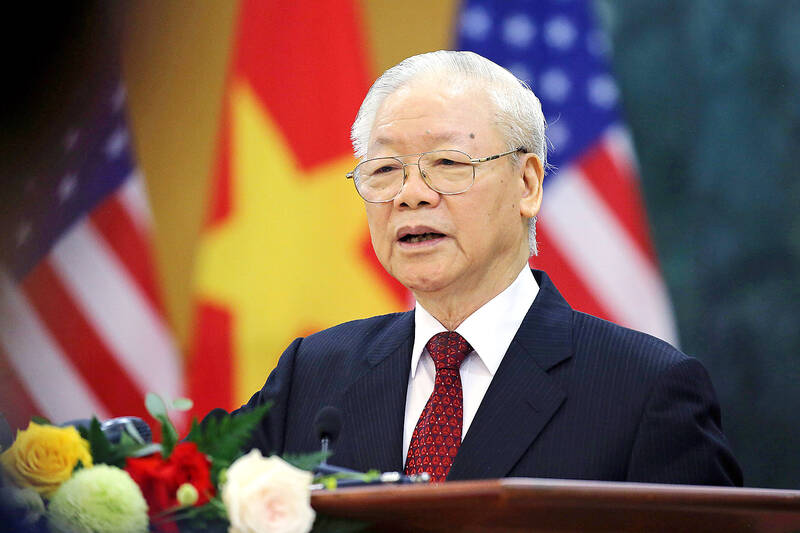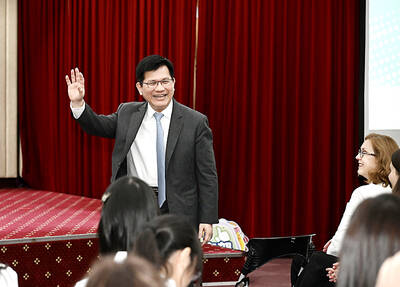The Ministry of Foreign Affairs (MOFA) on Friday expressed its condolences after Vietnamese Communist Party General Secretary Nguyen Phu Trong, the country’s most powerful politician, died at the age of 80.
Taiwan “pays tribute to [Trong’s] proactive leadership in developing Vietnam’s economy and society, as well as his dedication to enhancing regional prosperity and peace,” the ministry said in a news release, extending its sympathies to his family.
Taiwan would “continue to work with the people and government of Vietnam to further deepen the cooperation and friendship between the two countries,” it said.

Photo: EPA-EFE
Trong died following months of ill health and a state funeral would be held, state media said.
“General Secretary of the Central Committee of the Party Nguyen Phu Trong passed away at 13:38 on July 19, 2024, at the 108 Central Military Hospital due to old age and serious illness,” the Nhan Dan newspaper said.
Trong had dominated Vietnamese politics since 2011, when he was elected party chief. During his tenure, he worked to consolidate the Communist Party’s power in Vietnam’s single-party political system.
In the decade before he took the top role in Vietnamese politics, the balance of power had shifted more toward the governmental wing led by then-Vietnamese prime minister Nguyen Tan Dung.
Born in 1944 in Hanoi, Trong was a Marxist-Leninist ideologue who earned a degree in philosophy before becoming a member of the Vietnamese Communist Party at the age of 22. He viewed corruption as the single gravest threat in maintaining the party’s legitimacy.
“A country without discipline would be chaotic and unstable,” Trong said in 2016 after being re-elected to the party’s helm.
Officially, Vietnam has no top leader, but the Communist Party chief is traditionally seen as the most powerful.
Trong launched a sweeping anti-corruption campaign known as the “blazing furnace” that targeted business and political elites. Since 2016, thousands of party officials have been disciplined. They included former Vietnamese presidents Nguyen Xuan Phuc and Vo Van Thuong and the former Vietnamese National Assembly chairman Vuong Dinh Hue.
In all, eight members of the powerful Politburo were ousted on corruption allegations, while none were between 1986 and 2016.
UN Secretary-General Antonio Guterres said he was “saddened” by Trong’s death and called him “a pivotal figure in Vietnam’s recent history,” UN deputy spokesman Farhan Haq said.
Guterres said that during Trong’s tenure as president and Communist Party chief, “Vietnam continued its remarkable development journey to emerge as one of the world’s fastest-growing economies and an important partner for the United Nations,” the spokesman said.
Trong studied in the Soviet Union from 1981 to 1983, and there was speculation that under his leadership, Vietnam would move closer to Russia and China.
However, the Southeast Asian nation followed a pragmatic policy of “bamboo diplomacy,” a phrase he coined that referred to the plant’s flexibility, bending but not breaking in the shifting headwinds of geopolitics.
Vietnamese President To Lam was appointed the party caretaker on Thursday while Trong received treatment for his ill health and is widely viewed as most likely to become party chief.

FIREPOWER: On top of the torpedoes, the military would procure Kestrel II anti-tank weapons systems to replace aging license-produced M72 LAW launchers Taiwan is to receive US-made Mark 48 torpedoes and training simulators over the next three years, following delays that hampered the navy’s operational readiness, the Ministry of National Defense’s latest budget proposal showed. The navy next year would acquire four training simulator systems for the torpedoes and take receipt of 14 torpedoes in 2027 and 10 torpedoes in 2028, the ministry said in its budget for the next fiscal year. The torpedoes would almost certainly be utilized in the navy’s two upgraded Chien Lung-class submarines and the indigenously developed Hai Kun, should the attack sub successfully reach operational status. US President Donald Trump

Taiwan Semiconductor Manufacturing Co (TSMC, 台積電) is expected to start construction of its 1.4-nanometer chip manufacturing facilities at the Central Taiwan Science Park (CTSP, 中部科學園區) as early as October, the Chinese-language Liberty Times (the Taipei Times’ sister newspaper) reported yesterday, citing the park administration. TSMC acquired land for the second phase of the park’s expansion in Taichung in June. Large cement, construction and facility engineering companies in central Taiwan have reportedly been receiving bids for TSMC-related projects, the report said. Supply-chain firms estimated that the business opportunities for engineering, equipment and materials supply, and back-end packaging and testing could reach as high as

ALL QUIET: The Philippine foreign secretary told senators she would not respond to questions about whether Lin Chia-lung was in the country The Ministry of Foreign Affairs on Wednesday confirmed that a business delegation is visiting the Philippines, but declined to say whether Minister of Foreign Affairs Lin Chia-lung (林佳龍) is part of the group, as Philippine lawmakers raised questions over Lin’s reported visit. The group is being led by Deputy Minister of Agriculture Huang Chao-chin (黃昭欽), Chinese International Economic Cooperation Association (CIECA) chairman Joseph Lyu (呂桔誠) and US-Taiwan Business Council (USTBC) vice president Lotta Danielsson, the ministry said in a statement. However, sources speaking on condition of anonymity said that Lin is leading the delegation of 70 people. Filinvest New Clark City Innovation Park

DEFENSIVE EDGE: The liaison officer would work with Taiwan on drones and military applications for other civilian-developed technologies, a source said A Pentagon unit tasked with facilitating the US military’s adoption of new technology is soon to deploy officials to dozens of friendly nations, including Taiwan, the Financial Times reported yesterday. The US Department of Defense’s Defense Innovation Unit (DIU) is to send a representative to collaborate with Taiwan on drones and military applications from the semiconductor industry by the end of the year, the British daily reported, citing three sources familiar with the matter. “Drones will certainly be a focus, but they will also be looking at connecting to the broader civilian and dual-use ecosystem, including the tech sector,” one source was